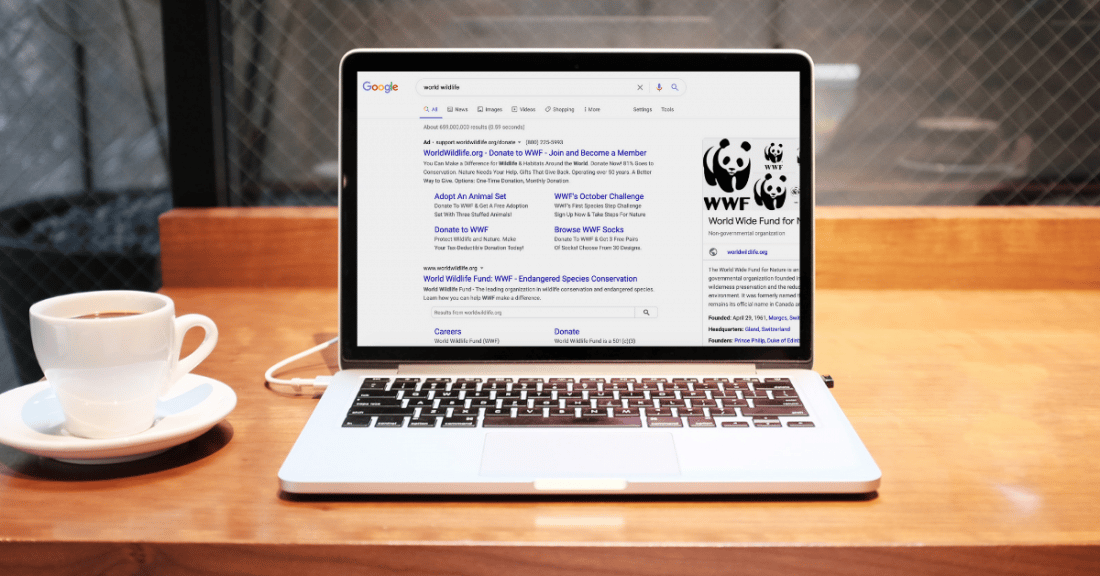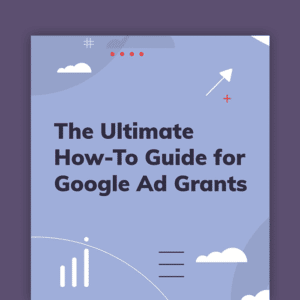
10 Google Ad Grant Best Practices
If there is anything this year has taught us, it’s to not take things for granted. An opportunity you don’t want to take for granted is Google Ad Grants for nonprofits. After all, it is free money from Google. Now, who doesn’t want that? Make the most of your Google Ad Grant account with the following best practices.
1. Don’t Chase Dollars, Gain Supporters
Here’s the deal: it is *very* difficult to fundraise with the Google Ad Grant. Why you ask? For one, unless you have national or global brand recognition, the number of people who are searching to donate to a specific organization is typically very low. For another, there are feature limitations (e.g. no remarketing) within a Google Ad Grant account that limit your ability to target the audiences who are primed to give. And lastly, it is nearly impossible to compete with *paid* Google Ad accounts with an Ad Grant. Especially with keywords like, “donate to X cause”.
Instead, the Ad Grant is best used to build your supporter list (i.e. the top of the funnel, in preparation for the donation, ask down the road). Ask visitors to sign up for your email newsletter, to follow your group’s Facebook page, fill out an online petition, or do some other low-risk activity. After building a relationship with these potential supporters, it will be much easier to ask for donations as the likelihood of them giving at that point is much higher.
2. Focus On Impact, Not Just Clicks
Time and again, we come across Ad Grant accounts that put too much emphasis on what we call “vanity metrics” — data points that don’t really move an organization’s mission forward. Instead of focusing on vanity metrics (like impressions, clicks, and time on page), we recommend measuring “conversions” — tangible actions that are meaningful to your marketing and fundraising goals such as email sign-ups, registrations, and donations. Not only does this give you the best sense possible of how your Ad Grant is performing, but it also informs Google’s algorithm to serve your ads to the right people at the right time.
3. Run Quality Control On Your Conversion Goals
We often come across accounts with broken and/or old conversion goals, goals that aren’t truly meaningful for the organization, or worse, no goals at all. We recommend taking stock regularly in Google Analytics, honing in on the top 5 conversions, and double/triple checking that they are set up correctly in order to eliminate the potential for bad data down the road.
4. Create Landing Pages That Convert
Your landing pages should be designed and built around driving people to take action for your cause. Organizations should use every tool in their arsenal to drive conversions, from email popups to gated content, to exclusive offerings, and more.
5. Build Campaigns Around Relevant Search Volume
Often, we get the question, “Can we use the Google Ad Grant to send people to X page?” Although there are several factors that determine whether or not your ad will show on Google, there first needs to be a critical mass of people searching for the content on the page in question. Therefore, we recommend conducting keyword research prior to building out your campaign.
6. Use Relevant Keywords
Relevancy is how well your website matches a website visitor’s expectations. For instance, if someone searches for “nonprofits,” they are most likely looking for the definition of the word, the history of nonprofits or possibly even a directory listing of nonprofit groups. They aren’t looking for your organization, so don’t waste your time and Ad Grant dollars going after generic nonprofit keywords such as “give,” “donate” or “volunteer.” Instead, be precise when selecting keywords and make sure they align with the content on your landing page.
7. Max Out Your Daily Ad Grant Budget
When building out a new Ad Grant account, we recommend setting every campaign to a budget of $330/day (i.e. the maximum amount). This allows you to start building data for your campaigns more quickly. Plus, anything you don’t spend each day is lost forever, i.e. the funds do not roll over. Once your account is maxing out the daily spend, you can adjust your budgets to your best-performing campaigns or ad groups.
8. Optimize Your Ad Grant Account for Conversions
When optimizing, make sure to review your Google Ad Grant account from different time frames (e.g. last 7 days, last 14 days, month over month, etc) to get a sense of how things are trending. Also, look at the account from different angles (keywords, ad groups, ads, campaigns, landing pages, locations, schedules, devices) and layer on CPC or Conversion Rate data. To improve account performance, consider adjusting campaign budgets and pausing high-cost keywords, ads, ad groups, campaigns, etc — based on conversion costs or cost-per-click. Don’t forget to inspect the landing page directly and see if there are either any form errors or ways you can improve the UX. Lastly, set up rules if you’re noticing trends and surefire ways to optimize the account automatically.
9. Use Data as Your Roadmap
Everything you could ever want to know about the performance of your Google Ad Grant is all at your fingertips. Are your ads performing better on weekdays vs. weekends? Are they performing better on desktop or mobile? Are the search terms that people use to find your ad relevant to your mission? Every time you log into your account, look for data points that will help guide your strategy.
10. Don’t Just Set It and Forget It
It can be tempting to simply set up your campaigns and let your ads run, week-to-week without any sort of maintenance. However, this can be problematic. Not only do you risk having your account deactivated, but you’re also likely missing out on new conversion opportunities. We recommend dedicating at least an hour per week to your account; more if you’re in the beginning stages of building out your campaigns.
____________________________________________________________________________________
For additional tips on optimizing your Googe Ad Grant, download our free resource, The Ultimate How-To Guide to Google Ad Grants. 
Looking for Google Ad Grant Management services? Send us a message here.